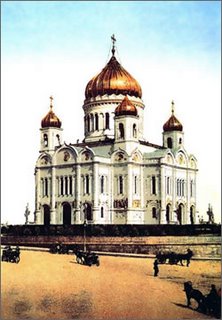Moscow's Temple of Christ the Savior: Destruction and Rebirth

Ryszard Kapuscinski's Imperium describes in detail how Stalin schemed to destroy Moscow's venerable Temple of Christ the Savior in 1931. Dedicated in 1883, the building required 45 years to complete (40 million bricks), was more than 30 stories tall and had walls of marble 3.2 meters thick. Stalin had decided to replace the building (after robbing it) with a Palace of the Soviets -a building larger than the Empire State Building (150 floors, 415 meters) with a 100 meter statue of Lenin on top (think 3x higher than the Statue of Liberty).
To Kapuscinski, this scenario is comparable to a French leader deciding secretly raze the Cathedral of Notre Dame. Yet, the city's inhabitants passively continue on with daily business. Fortunately, Stalin's paranoia, attendance to purges, and distraction with annexation and war leaves the project on the back burner. After his death, the remaining base of the cathedral is used as a swimming pool. The author does not yet realize that in 2 years after publishing his book the Patriarch will begin to reconstruct the Cathedral to look much like it once did. Byzantines.net(the above link) does an excellent job detailing the Temple's history.

